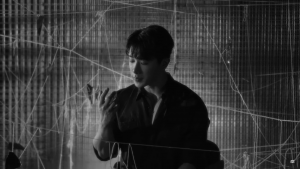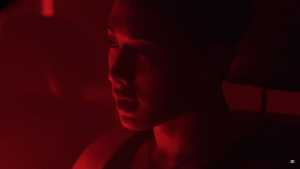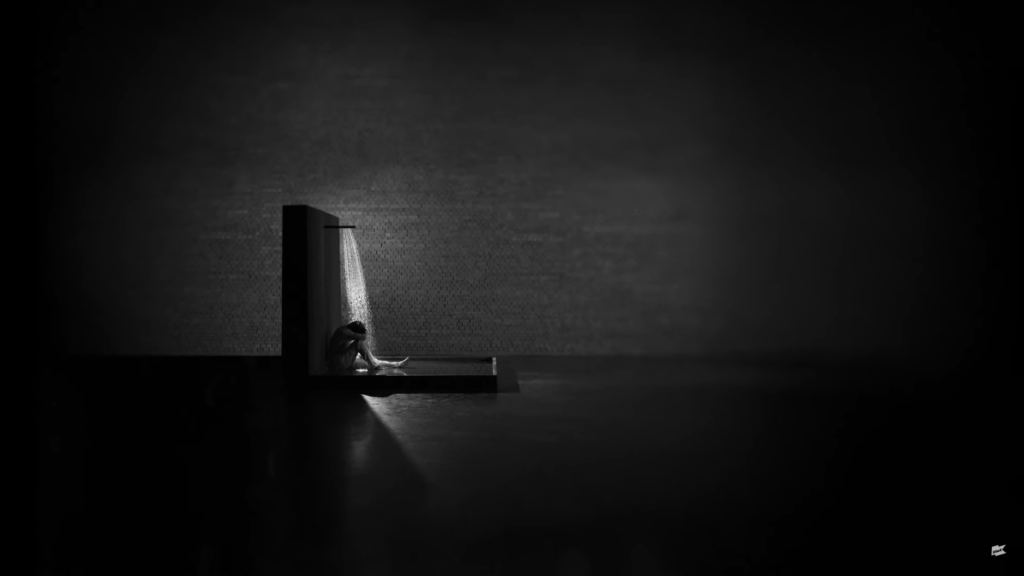“…I want to give happiness, rather than make them hurt, to those who support and trust me…From now on, my story starts again.”
Wonho for TeenVogue
Following a nearly ten-month hiatus from the entertainment industry, Wonho, formerly of Monsta X, made a heartbreaking and intimate comeback with the pre-release MV “Losing You.” I’ll save you the grisly details of the scandal that led to his departure from Monsta X, but thankfully, his comeback marks a shift in the industry, allowing him to start anew following fairly harsh allegations. One can only imagine what he has been through professionally, socially, and emotionally after so much drama, but “Losing You” feels incredibly personal and alludes to his profound dedication to and from fans.
From the onset, the visuals in the MV have an “Eyes, Nose, Lips” (Taeyang) feel–black and white, far-off gazes, and rain-soaked camera shots, not surprising given the subject of the song. While these scenes are all mildly stereotypical and maybe even predictable, they effectively provide a strong thematic foundation for the lyrics and music. Most would likely relate to the helpless feeling of staring out a window in thought, or sitting alone in the shower as the water relentlessly flows over.
In the second verse, however, the scene shifts to a car low-lit in red lights, as Wonho sings about a “fast car and no brakes” and the “rush that I crave.” In the last chorus, the car returns with Wonho both in front of the headlights and inside the car seemingly confronting his former self. This is striking in that Wonho has expressed in recent interviews that the old Wonho of Monsta X is still the current Wonho, just with new experiences and more mature. However, the MV suggests more of a rebirth or rewriting of his persona rather than the evolution of a new chapter in his career.

Complementary to the imagery and message of the song is the gentle, piano-led structure. The gradual progression to the chorus that layers in vocal chops and synthetic strings is subtle but impactful. Stepping back and listening to the full texture of the song, the song builds steadily from the first verse, comes to a climax at the first post-chorus, and falls sharply in the last chorus. While this may sound strange, it fits with the MV in the sense that the last chorus is when the MV thematically comes to a head. Wonho is screaming out and looking into the headlights of a mysterious car before the last post-chorus returns, and the MV melts into Wonho standing on stage looking out into a crowd.
One of the most interesting sections of the music is the post-chorus. The chorus and verses are well-written and beautiful in their simplicity, but the post-chorus is an interesting and ear-catching shift that creates tension. It is short in the scope of the song, but the vocal does not resolve until the end of the phrase, making it sound unstable until the chorus returns again. It also makes the build to the last chorus more impactful, fading out and making the song end somewhat unresolved (for all you music theory nerds out there: it may actually end on an open fifth rather than a stable tonic or dominant chord, from what I can tell.) This particularly tugs at the heartstrings as Wonho looks out over a faceless crowd, a potentially indefinite future ahead of him as well.

Saving the best for last, the lyrics are the star here. Between Wonho’s increased involvement in composing and producing along with a near army of literal award-winning songwriters, this comes as no surprise. However, what is a surprise is Wonho’s choice to debut with an all English song. Even during his time in Monsta X, he was not known for being the greatest English speaker out of the bunch (peek almost any of their tour vlogs in America, English interviews, or this goofy live of Minhyuk and Wonho pranking the other members with Google translate.)
With K-pop becoming increasingly global in scope as well as amassing a greater population of international Monbebe, this choice seems like a deliberate move on Wonho and his company Highline Entertainment’s part. Returning from scandal can be overwhelmingly difficult for any public figure to return from, but especially idols who are seen as role models and representative members of society.
All this aside, the lyrics are poetic and expressive. “Losing me is better than losing you” is the main mantra throughout which is a demonstrative phrase in itself, but is complemented by other lyrics like “I would go to war for you” and “don’t you know that I would die for you if I knew that you would make it through?” The lyrics are keen, complex, and beautiful in a way that tugs at the heartstrings. Paired with his experiences from the last ten months, it reads like a love song within a love song to his fans that stayed by his side, despite the media storm of assumptions and assertions likely beyond his control. While on the outside he is quite frankly ripped, his recent interviews highlight how genuinely thankful he is to have new opportunities to continue making music, connecting with fans, giving happiness, and exchanging positive energy with Monbebe turned Wenee (his own new fandom name.)

While it seems like the old Wonho is no more, he assures fans and listeners that he is writing a new chapter–one with a more mature demeanor that can craft his own story and show his own unique charms. It looks like this era begins with a intimate whispered nothings rather than a bang, and after the year he has had, maybe that is for the best.
(TeenVogue, YouTube, Forbes, Rolling Stone, Vlive, Images via Highline Entertainment)



